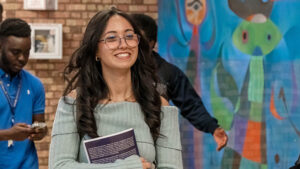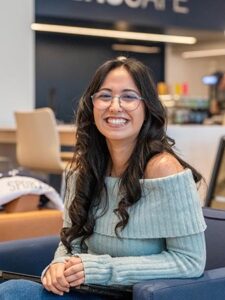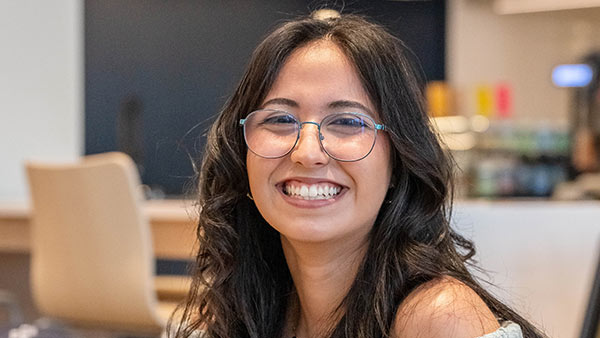September 9, 2025
Honing her voice for change: Salma El Hamdani ’27
Growing up in Casablanca, Morocco, Salma El Hamdani ’27 witnessed how women’s voices were often dismissed and interrupted: it was her first exposure to some of the systemic oppression that existed in her country. When El Hamdani started her communications degree at The College of St. Scholastica, she realized the profound impact of messaging in shaping these societal norms. “That’s what art is about,” she said. “It’s all about taking all of the societal issues and having them as a big message to the audience. It’s about spreading awareness through art and film. It’s a very broad and big industry, and I see it as always being helpful in spreading messages.”
Combining art and social change
As she continues in her studies, El Hamdani hopes to combine her focus on communications, media, film, and marketing with her desire for social change: “I want to work in the film industry if the opportunity arises; I also have other plans. One of them is to start a non-profit that helps women who are stuck in abusive relationships. I want to raise awareness that this type of behavior is not normal and to encourage women to break free from all of the generational trauma and leave their toxic relationships to become more independent.”
In a step toward her future career, El Hamdani has embraced her time at St. Scholastica with active involvement in the International Club, Media Club, and Theatre Club, where she recently acted in the production of “John Proctor is the Villain.” Additionally, her involvement with United for Africa has provided her “a great way to stay connected to my culture while also sharing it with others and simply exchanging all cultures with students that have different backgrounds and stories to tell.”
Navigating change in the journey
The transition away from family and life at home has come with its fair share of challenges. “When I first got here, I had some troubles adjusting to how quiet and calm Duluth was,” El Hamdani admitted, reflecting on the fast-paced life of Casablanca.
 Yet, as time has passed, she has grown to appreciate her new environment throughout the seasons. “It was definitely a big change, but now I really like how peaceful Duluth is, and I love the nature, especially in the fall when the leaves turn red. It’s really, really beautiful. I love the fall and the summer with the waterfalls.”
Yet, as time has passed, she has grown to appreciate her new environment throughout the seasons. “It was definitely a big change, but now I really like how peaceful Duluth is, and I love the nature, especially in the fall when the leaves turn red. It’s really, really beautiful. I love the fall and the summer with the waterfalls.”
El Hamdani also encountered some cultural adjustments: “I was really surprised by how much people valued personal space and making decisions on their own. Students here are allowed to drive their cars at such a very young age, and I found that really interesting because back home, you don’t see people driving until they’re 18,” she continued. “I also can’t believe that I’m expected to do my own taxes. I’m almost 20 and I don’t know how yet.”
Respect across cultures
Another unique challenge El Hamdani has noticed is that forming genuine friendships with men her age has proven to be difficult in the United States. “Sometimes it feels like they see me in a certain way, and I have to work harder to be respected for who I truly am,” she said.
 This has prompted her to reflect on cultural differences. “There’s definitely some forms of misogyny that I noticed, and it’s different from what I experienced back home, where guys my age often saw me as a true friend or like a sister,” she shared.
This has prompted her to reflect on cultural differences. “There’s definitely some forms of misogyny that I noticed, and it’s different from what I experienced back home, where guys my age often saw me as a true friend or like a sister,” she shared.
“I think that both cultures have their issues. I’ve seen some patriarchal norms back home, too, how it’s sometimes considered normal for a husband to yell at his wife, or the disrespect that women and wives face in public. It’s just very sad to see that both societies still have their issues related to gender equality and gender roles.”
Education and awareness
Combined with her passion for women’s rights, El Hamdani brings a unique cross-cultural perspective on how borders shape the relationships between genders and how much of the treatment of women is passed down through generations. “My mom is my biggest role model,” she explained. “She has always encouraged me to get a good education and has been my number one supporter. She values education a lot since she also faced challenges related to gender equality. She always reminds me to be an independent woman and not rely on anyone.”
El Hamdani also acknowledges the emergence of non-profit organizations aimed at combating the patriarchal challenges women face in Morocco. “There’s still awareness going around, trying to change things, and it’s nice to have those support systems set in place,” she noted.
Advice for fellow Saints
El Hamdani encourages her fellow students to be open to new experiences: “Take advantage of your study abroad experience by meeting new people, exchanging knowledge and cultures, and when homesickness hits hard, it’s okay to reach out for help. It’s also important to use all of the resources that the school offers, go to club events, make connections with your professors, and simply be willing to learn and grow, because that’s what life is about,” she shared. “It’s about connections. We help each other by learning and growing together.”


